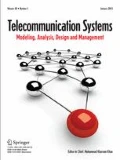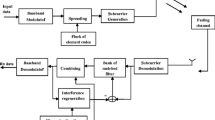Abstract
The unprecedented frequency diversity gain offered by complementary coded code-division multiple access (CC-CDMA) makes it more attractive than conventional CDMA systems in frequency selective fading channels. CC-CDMA loses its interference-resilient capability due to non-ideal correlation characteristics of complementary codes (CC) under uplink asynchronous communications. The existence of multiple access interference (MAI) in asynchronous systems results in drastic reduction in error rate performance in CC-CDMA systems. In this paper, the analysis of successive interference cancellation (SIC) is proposed for CC-CDMA systems as an alternative to existing non-interference cancellation schemes in uplink communication. The average bit error probability expressions for single branch and M-branch CC-CDMA systems operating under Rician fading channels are derived using alternate integral expression of Q-function. The accuracy of obtained closed form error probability expressions are confirmed through the proposed joint SIC with maximal ratio combining and minimum mean square error combining techniques in uplink CC-CDMA systems. The significance of soft-decision compared to hard decision SIC for CC-CDMA systems is also analyzed for both equal power and extreme near-far conditions. Furthermore, the simulation results exposed that significant performance improvement is obtained under near-far situations in uplink asynchronous CC-CDMA systems overcoming the effects of MAI and achieving improved system capacity.








Similar content being viewed by others

References
Adachi, F., Garge, D., Takaoka, S., & Takeda, K. (2005). Broadband CDMA techniques. IEEE Wireless Communication, 12(2), 8–18.
Adibi, S., Mobasher, A., & Tofigh, T. (2010). Fourth-generation wireless networks: Applications and innovations. NY: Information Science Reference.
Chen, H. H., Chu, S. W., Kuroyanagi, N., & Vinck, A. J. H. (2007). An algebraic approach to generate a superset of perfect complementary codes for interference-free CDMA. Wireless Communications and Mobile Computing, 7(5), 605–622.
Chen, H. H., Chu, S. W., & Guizani, M. (2008). On next generation CDMA technologies; The Real approach for perfect orthogonal code generation. IEEE Transactions on Vehicular Technology, 57(5), 2822–2833.
Magana, M. E., Rajatasereekul, T., Hank, D., & Chen, H. H. (2007). Design of MC-CDMA system that uses complete complementary orthogonal spreading codes. IEEE Transactions vehicular Technology, 56(5), 2976–2989.
Chen, H. H., Yeh, J. F., & Suehiro, N. (2001). A multicarrier CDMA architecture based on orthogonal complementary codes for new generations of wideband wireless communications. IEEE Communication Magazine, 39(10), 126–135.
Chen, H. H., Chiu, H. W., & Guizani, M. (2006). Orthogonal complementary codes for interference free CDMA technologies. IEEE Wireless Communication, 13(1), 68–79.
Verdu, S. (1998). Multiuser detection. Cambridge: Cambridge University Press.
Verdu, S. (1986). Minimum probability of error for asynchronous Gaussian multiple access channels. IEEE Transcations on Information Theory, 32(1), 85–96.
Hsieh, Y. T., & Wu, W. R. (2005). Optimal two stage decoupled partial PIC receivers for multi user detection. IEEE Transactions on Wireless Communication, 4(1), 112–127.
Cai, Y., & De Lamare, R. C. (2009). Space time adaptive MMSE multi user decision feedback detectors with multiple-feedback interference cancellation for CDMA systems. IEEE Transactions Vehicular Technology, 58(8), 4129–4139.
Meng, W. H., Sun, S. Y., & Chen, H. H. (2013). Multiuser interference cancellation in complementary coded CDMA with diversity gain. IEEE Wireless Communication Letters, 2(3), 303–306.
Judson, D., & Raj, A. A. (2016). Performance of multicarrier complementary coded CDMA under frequency selective Nakagami-m fading channels. Eurasip Journal on Wireless Communication and Networking, 67, 1–9.
Judson, D., Bhaskar, V., & Selvaraj, K. (2018). Pre-equalization schemes for MIMO CC-CDMA systems over frequency-selective fading channels. Wireless personal Communication, 98(1), 1587–1603.
Sun, S. Y., Meng, W. X., & Chen, H. H. (2013) Uplink pre equalization for CC-CDMA systems under frequency selective fading. Proceedings of IEEE ICC (pp. 5317–5321).
Buehrer, R. M., Mendoza, N. S. C., & Woerner, B. D. (2000). A simulation comparison of multiuser receivers for cellular CDMA. IEEE Transactions vehicular Technology, 40(4), 1065–1085.
Hui, A. L. C., & Lataief, K. B. (1998). Multiuser asynchronous DS/CDMA detection in multipath fading links. IEEE Transactions on Information Theory, 44(8), 502–515.
Zha, W., & Blostein, S. D. (2003). Soft-decision multistage multiuser interference cancellation. IEEE Transactions Vehicular Technology, 52(2), 380–389.
Djebbar, A. B., Djebbari, A., Bouziani, M., & Rouvaen, J. M. (2003). Derivations of new expressions of bit error rate for MC-CDMA system in Nakagami fading channel. AEU International Journal of Electronics and Communication, 57(6), 395–402.
Smida, B., Hanzo, L., & Affes, S. (2010). Exact BER performance of asynchronous MC DS-CDMA over fading channels. IEEE Transactions on Wireless Communication, 9(4), 1249–1254.
Simon, M. K., & Alouini, M. S. (1998). A unified approach to the performance analysis of digital communication over generalized fading channels. Proceedings of IEEE, 86(9), 1860–1877.
Chen, H. H. (2007). The next generation CDMA technologies. Hoboken: Wiley.
Sun, S. Y., Hu, Y. L., Chen, H. H., & Meng, W. X. (2016). Joint Pre-equalization and Adaptive combining for CC-CDMA systems over Asynchronous frequency selective fading channels. IEEE Transactions on Vehicular Technology, 65(7), 5175–5184.
Judson, D., & Bhaskar, V. (2018). Error rate analysis of SIMO-CDMA with complementary codes under multipath fading channels. Wireless personal Communication, 98(2), 1663–1677.
Sun, J., & Reed, I. S. (1999). Performance of MDPSK, MPSK and non-coherent MFSK in wireless Rician fading channels. IEEE Transactions on Communication, 47(6), 813–816.
Sun, J., & Reed, I. S. (2003). Linear diversity analyses for MPSK in Rician fading channels. IEEE Transactions on Communication, 51(11), 1749–1753.
Acknowledgements
The authors would like to thank the anonymous reviewers for their stimulating and helpful comments to improve the quality and presentation of this paper.
Author information
Authors and Affiliations
Corresponding author
Additional information
Publisher’s Note
Note Springer Nature remains neutral with regard to jurisdictional claims in published maps and institutional affiliations.
Rights and permissions
About this article
Cite this article
Davix, X.A., Judson, D. Successive interference cancellation in asynchronous CC-CDMA systems under Rician fading channels. Telecommun Syst 72, 261–271 (2019). https://doi.org/10.1007/s11235-019-00562-y
Published:
Issue Date:
DOI: https://doi.org/10.1007/s11235-019-00562-y



